Unit 33: Justice, Punishment, and Rehabilitation: Anjem Choudhary Case
VerifiedAdded on 2023/06/08
|11
|3893
|461
Report
AI Summary
This report provides an in-depth analysis of the criminal justice system in the UK, focusing on the core concepts of justice, punishment, and rehabilitation. It examines the effectiveness of these elements, particularly in the context of the Anjem Choudhary case, who was punished for supporting ISIS. The report delves into various legal theories and international conventions, such as the International Convention on Civil and Political Rights and the Nelson Mandela Rules, highlighting their role in shaping the UK's approach to offender reform. It discusses the objectives of the criminal justice system, including crime reduction, fair legal processes, and victim rights, and analyzes the effectiveness of different sentencing approaches, including imprisonment and community sentences. The report also explores the role of the Prison Reform Trust and the Rehabilitation of Offenders Act 1974, emphasizing the importance of rehabilitation programs, vocational training, and the reintegration of offenders into society. Furthermore, it examines the impact of government initiatives, legal precedents, and the protection of prisoners' fundamental rights, providing a comprehensive overview of the UK's efforts to balance punishment with the rehabilitation of offenders.
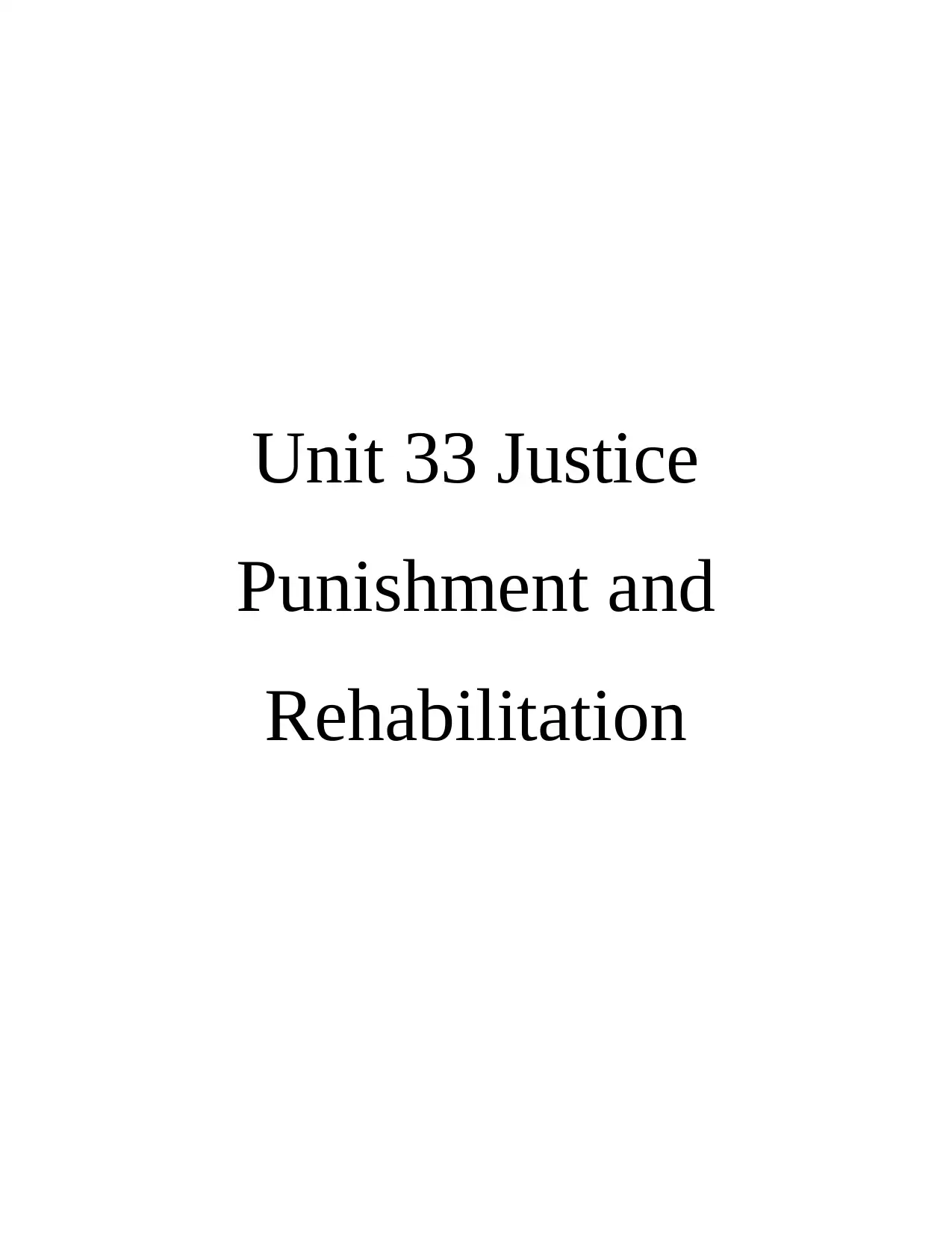
Unit 33 Justice
Punishment and
Rehabilitation
Punishment and
Rehabilitation
Paraphrase This Document
Need a fresh take? Get an instant paraphrase of this document with our AI Paraphraser

Table of Contents
INTRODUCTION ..........................................................................................................................3
TASK ..............................................................................................................................................3
CONCLUSION ...............................................................................................................................9
REFERENCES..............................................................................................................................11
INTRODUCTION ..........................................................................................................................3
TASK ..............................................................................................................................................3
CONCLUSION ...............................................................................................................................9
REFERENCES..............................................................................................................................11
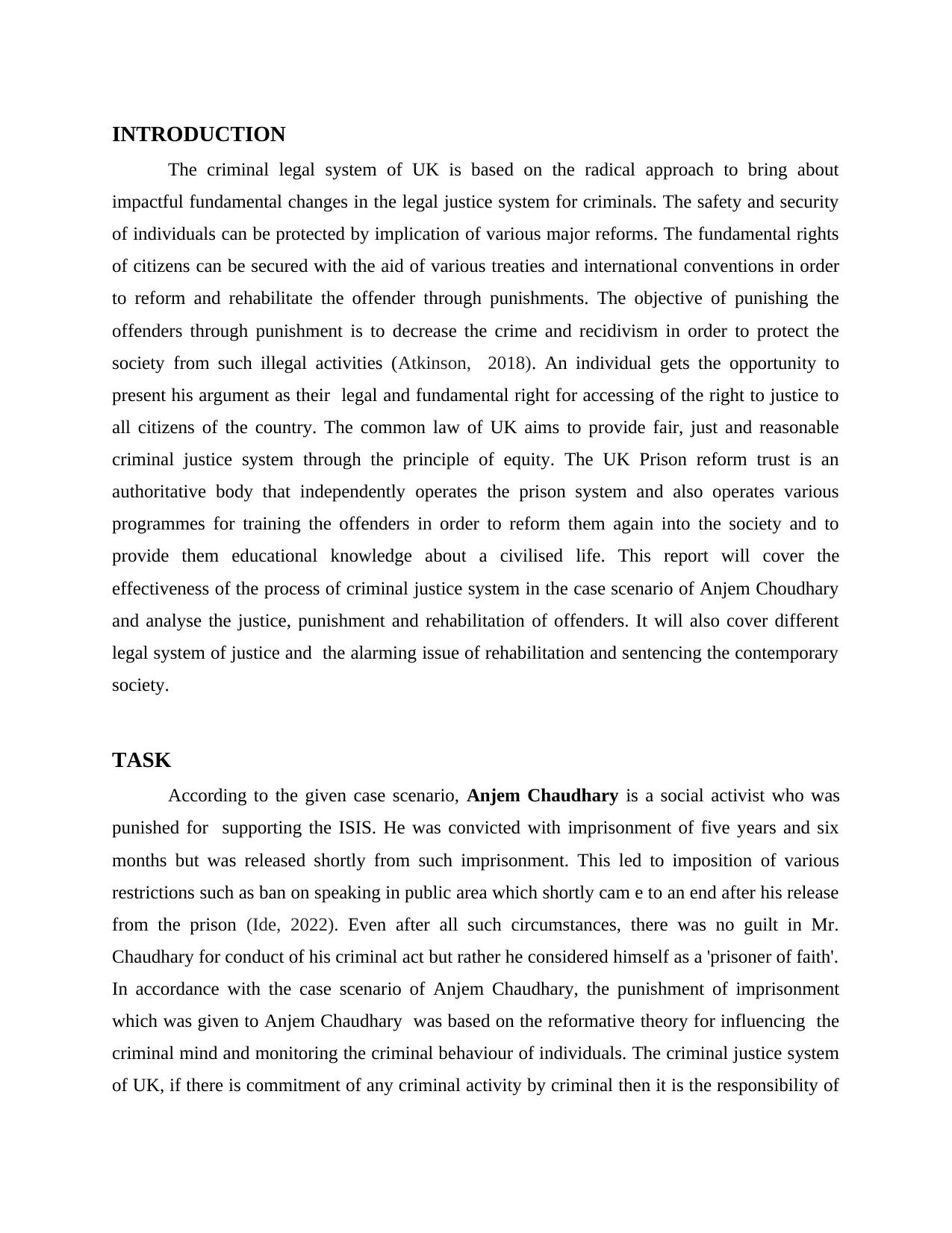
INTRODUCTION
The criminal legal system of UK is based on the radical approach to bring about
impactful fundamental changes in the legal justice system for criminals. The safety and security
of individuals can be protected by implication of various major reforms. The fundamental rights
of citizens can be secured with the aid of various treaties and international conventions in order
to reform and rehabilitate the offender through punishments. The objective of punishing the
offenders through punishment is to decrease the crime and recidivism in order to protect the
society from such illegal activities (Atkinson, 2018). An individual gets the opportunity to
present his argument as their legal and fundamental right for accessing of the right to justice to
all citizens of the country. The common law of UK aims to provide fair, just and reasonable
criminal justice system through the principle of equity. The UK Prison reform trust is an
authoritative body that independently operates the prison system and also operates various
programmes for training the offenders in order to reform them again into the society and to
provide them educational knowledge about a civilised life. This report will cover the
effectiveness of the process of criminal justice system in the case scenario of Anjem Choudhary
and analyse the justice, punishment and rehabilitation of offenders. It will also cover different
legal system of justice and the alarming issue of rehabilitation and sentencing the contemporary
society.
TASK
According to the given case scenario, Anjem Chaudhary is a social activist who was
punished for supporting the ISIS. He was convicted with imprisonment of five years and six
months but was released shortly from such imprisonment. This led to imposition of various
restrictions such as ban on speaking in public area which shortly cam e to an end after his release
from the prison (Ide, 2022). Even after all such circumstances, there was no guilt in Mr.
Chaudhary for conduct of his criminal act but rather he considered himself as a 'prisoner of faith'.
In accordance with the case scenario of Anjem Chaudhary, the punishment of imprisonment
which was given to Anjem Chaudhary was based on the reformative theory for influencing the
criminal mind and monitoring the criminal behaviour of individuals. The criminal justice system
of UK, if there is commitment of any criminal activity by criminal then it is the responsibility of
The criminal legal system of UK is based on the radical approach to bring about
impactful fundamental changes in the legal justice system for criminals. The safety and security
of individuals can be protected by implication of various major reforms. The fundamental rights
of citizens can be secured with the aid of various treaties and international conventions in order
to reform and rehabilitate the offender through punishments. The objective of punishing the
offenders through punishment is to decrease the crime and recidivism in order to protect the
society from such illegal activities (Atkinson, 2018). An individual gets the opportunity to
present his argument as their legal and fundamental right for accessing of the right to justice to
all citizens of the country. The common law of UK aims to provide fair, just and reasonable
criminal justice system through the principle of equity. The UK Prison reform trust is an
authoritative body that independently operates the prison system and also operates various
programmes for training the offenders in order to reform them again into the society and to
provide them educational knowledge about a civilised life. This report will cover the
effectiveness of the process of criminal justice system in the case scenario of Anjem Choudhary
and analyse the justice, punishment and rehabilitation of offenders. It will also cover different
legal system of justice and the alarming issue of rehabilitation and sentencing the contemporary
society.
TASK
According to the given case scenario, Anjem Chaudhary is a social activist who was
punished for supporting the ISIS. He was convicted with imprisonment of five years and six
months but was released shortly from such imprisonment. This led to imposition of various
restrictions such as ban on speaking in public area which shortly cam e to an end after his release
from the prison (Ide, 2022). Even after all such circumstances, there was no guilt in Mr.
Chaudhary for conduct of his criminal act but rather he considered himself as a 'prisoner of faith'.
In accordance with the case scenario of Anjem Chaudhary, the punishment of imprisonment
which was given to Anjem Chaudhary was based on the reformative theory for influencing the
criminal mind and monitoring the criminal behaviour of individuals. The criminal justice system
of UK, if there is commitment of any criminal activity by criminal then it is the responsibility of
⊘ This is a preview!⊘
Do you want full access?
Subscribe today to unlock all pages.

Trusted by 1+ million students worldwide
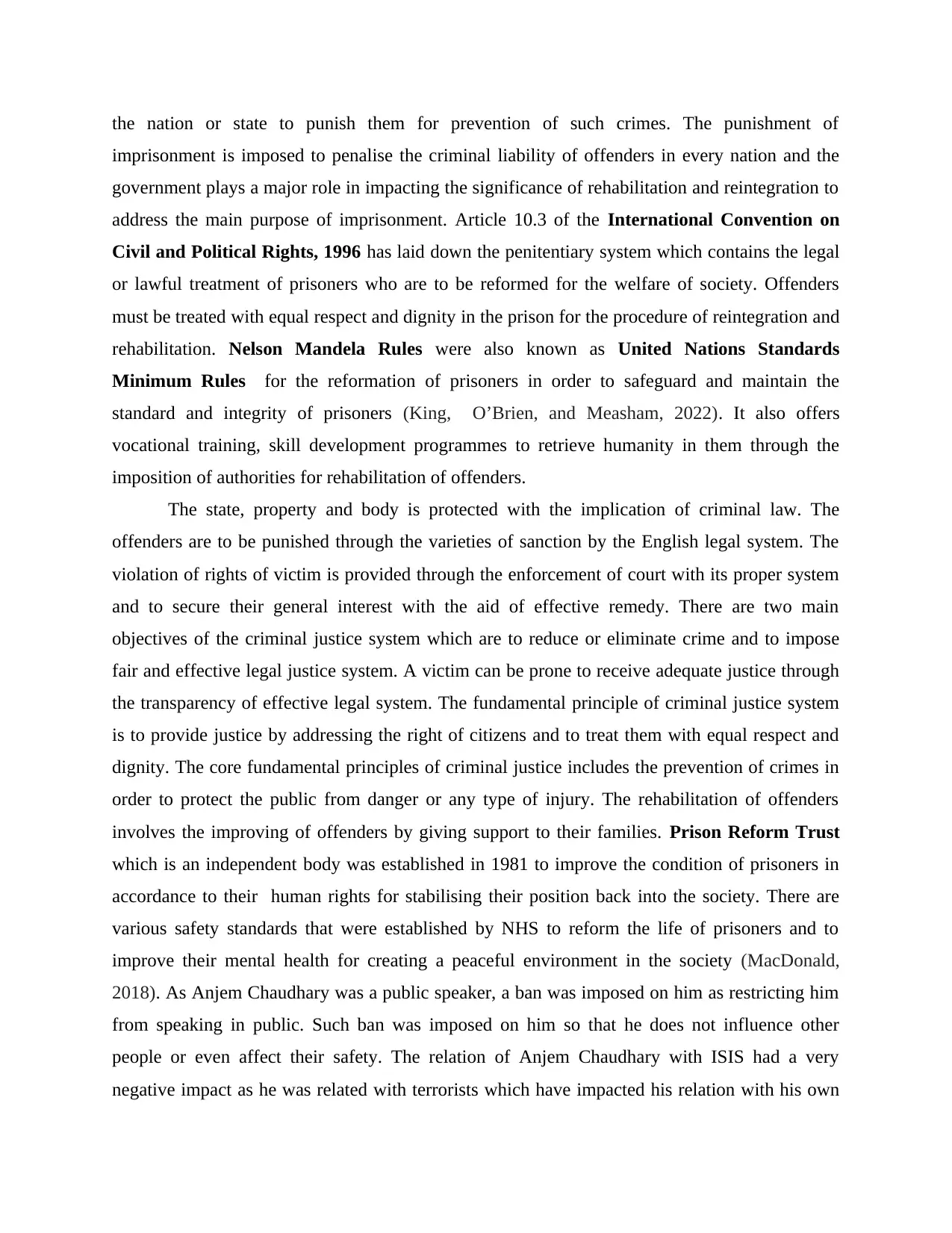
the nation or state to punish them for prevention of such crimes. The punishment of
imprisonment is imposed to penalise the criminal liability of offenders in every nation and the
government plays a major role in impacting the significance of rehabilitation and reintegration to
address the main purpose of imprisonment. Article 10.3 of the International Convention on
Civil and Political Rights, 1996 has laid down the penitentiary system which contains the legal
or lawful treatment of prisoners who are to be reformed for the welfare of society. Offenders
must be treated with equal respect and dignity in the prison for the procedure of reintegration and
rehabilitation. Nelson Mandela Rules were also known as United Nations Standards
Minimum Rules for the reformation of prisoners in order to safeguard and maintain the
standard and integrity of prisoners (King, O’Brien, and Measham, 2022). It also offers
vocational training, skill development programmes to retrieve humanity in them through the
imposition of authorities for rehabilitation of offenders.
The state, property and body is protected with the implication of criminal law. The
offenders are to be punished through the varieties of sanction by the English legal system. The
violation of rights of victim is provided through the enforcement of court with its proper system
and to secure their general interest with the aid of effective remedy. There are two main
objectives of the criminal justice system which are to reduce or eliminate crime and to impose
fair and effective legal justice system. A victim can be prone to receive adequate justice through
the transparency of effective legal system. The fundamental principle of criminal justice system
is to provide justice by addressing the right of citizens and to treat them with equal respect and
dignity. The core fundamental principles of criminal justice includes the prevention of crimes in
order to protect the public from danger or any type of injury. The rehabilitation of offenders
involves the improving of offenders by giving support to their families. Prison Reform Trust
which is an independent body was established in 1981 to improve the condition of prisoners in
accordance to their human rights for stabilising their position back into the society. There are
various safety standards that were established by NHS to reform the life of prisoners and to
improve their mental health for creating a peaceful environment in the society (MacDonald,
2018). As Anjem Chaudhary was a public speaker, a ban was imposed on him as restricting him
from speaking in public. Such ban was imposed on him so that he does not influence other
people or even affect their safety. The relation of Anjem Chaudhary with ISIS had a very
negative impact as he was related with terrorists which have impacted his relation with his own
imprisonment is imposed to penalise the criminal liability of offenders in every nation and the
government plays a major role in impacting the significance of rehabilitation and reintegration to
address the main purpose of imprisonment. Article 10.3 of the International Convention on
Civil and Political Rights, 1996 has laid down the penitentiary system which contains the legal
or lawful treatment of prisoners who are to be reformed for the welfare of society. Offenders
must be treated with equal respect and dignity in the prison for the procedure of reintegration and
rehabilitation. Nelson Mandela Rules were also known as United Nations Standards
Minimum Rules for the reformation of prisoners in order to safeguard and maintain the
standard and integrity of prisoners (King, O’Brien, and Measham, 2022). It also offers
vocational training, skill development programmes to retrieve humanity in them through the
imposition of authorities for rehabilitation of offenders.
The state, property and body is protected with the implication of criminal law. The
offenders are to be punished through the varieties of sanction by the English legal system. The
violation of rights of victim is provided through the enforcement of court with its proper system
and to secure their general interest with the aid of effective remedy. There are two main
objectives of the criminal justice system which are to reduce or eliminate crime and to impose
fair and effective legal justice system. A victim can be prone to receive adequate justice through
the transparency of effective legal system. The fundamental principle of criminal justice system
is to provide justice by addressing the right of citizens and to treat them with equal respect and
dignity. The core fundamental principles of criminal justice includes the prevention of crimes in
order to protect the public from danger or any type of injury. The rehabilitation of offenders
involves the improving of offenders by giving support to their families. Prison Reform Trust
which is an independent body was established in 1981 to improve the condition of prisoners in
accordance to their human rights for stabilising their position back into the society. There are
various safety standards that were established by NHS to reform the life of prisoners and to
improve their mental health for creating a peaceful environment in the society (MacDonald,
2018). As Anjem Chaudhary was a public speaker, a ban was imposed on him as restricting him
from speaking in public. Such ban was imposed on him so that he does not influence other
people or even affect their safety. The relation of Anjem Chaudhary with ISIS had a very
negative impact as he was related with terrorists which have impacted his relation with his own
Paraphrase This Document
Need a fresh take? Get an instant paraphrase of this document with our AI Paraphraser
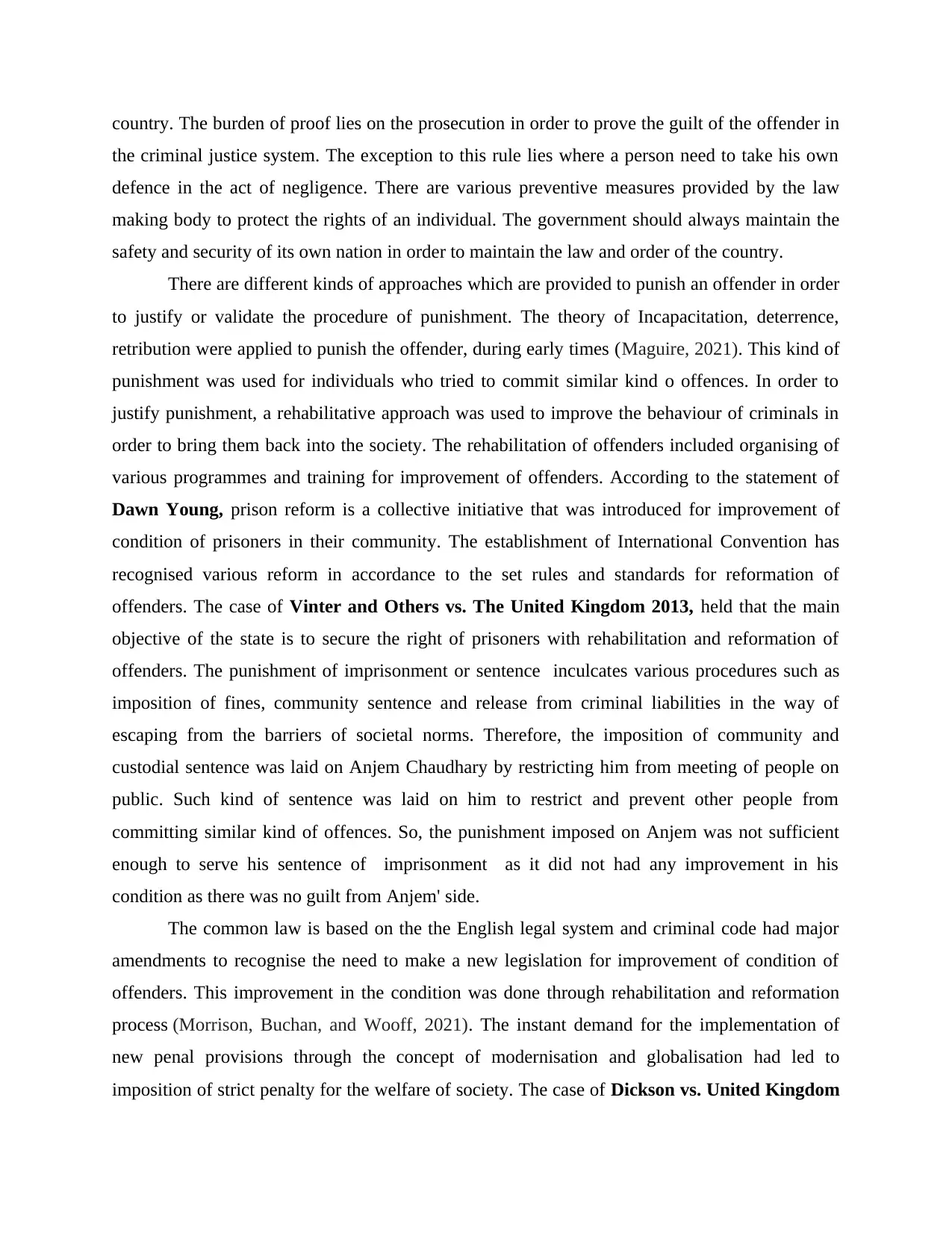
country. The burden of proof lies on the prosecution in order to prove the guilt of the offender in
the criminal justice system. The exception to this rule lies where a person need to take his own
defence in the act of negligence. There are various preventive measures provided by the law
making body to protect the rights of an individual. The government should always maintain the
safety and security of its own nation in order to maintain the law and order of the country.
There are different kinds of approaches which are provided to punish an offender in order
to justify or validate the procedure of punishment. The theory of Incapacitation, deterrence,
retribution were applied to punish the offender, during early times (Maguire, 2021). This kind of
punishment was used for individuals who tried to commit similar kind o offences. In order to
justify punishment, a rehabilitative approach was used to improve the behaviour of criminals in
order to bring them back into the society. The rehabilitation of offenders included organising of
various programmes and training for improvement of offenders. According to the statement of
Dawn Young, prison reform is a collective initiative that was introduced for improvement of
condition of prisoners in their community. The establishment of International Convention has
recognised various reform in accordance to the set rules and standards for reformation of
offenders. The case of Vinter and Others vs. The United Kingdom 2013, held that the main
objective of the state is to secure the right of prisoners with rehabilitation and reformation of
offenders. The punishment of imprisonment or sentence inculcates various procedures such as
imposition of fines, community sentence and release from criminal liabilities in the way of
escaping from the barriers of societal norms. Therefore, the imposition of community and
custodial sentence was laid on Anjem Chaudhary by restricting him from meeting of people on
public. Such kind of sentence was laid on him to restrict and prevent other people from
committing similar kind of offences. So, the punishment imposed on Anjem was not sufficient
enough to serve his sentence of imprisonment as it did not had any improvement in his
condition as there was no guilt from Anjem' side.
The common law is based on the the English legal system and criminal code had major
amendments to recognise the need to make a new legislation for improvement of condition of
offenders. This improvement in the condition was done through rehabilitation and reformation
process (Morrison, Buchan, and Wooff, 2021). The instant demand for the implementation of
new penal provisions through the concept of modernisation and globalisation had led to
imposition of strict penalty for the welfare of society. The case of Dickson vs. United Kingdom
the criminal justice system. The exception to this rule lies where a person need to take his own
defence in the act of negligence. There are various preventive measures provided by the law
making body to protect the rights of an individual. The government should always maintain the
safety and security of its own nation in order to maintain the law and order of the country.
There are different kinds of approaches which are provided to punish an offender in order
to justify or validate the procedure of punishment. The theory of Incapacitation, deterrence,
retribution were applied to punish the offender, during early times (Maguire, 2021). This kind of
punishment was used for individuals who tried to commit similar kind o offences. In order to
justify punishment, a rehabilitative approach was used to improve the behaviour of criminals in
order to bring them back into the society. The rehabilitation of offenders included organising of
various programmes and training for improvement of offenders. According to the statement of
Dawn Young, prison reform is a collective initiative that was introduced for improvement of
condition of prisoners in their community. The establishment of International Convention has
recognised various reform in accordance to the set rules and standards for reformation of
offenders. The case of Vinter and Others vs. The United Kingdom 2013, held that the main
objective of the state is to secure the right of prisoners with rehabilitation and reformation of
offenders. The punishment of imprisonment or sentence inculcates various procedures such as
imposition of fines, community sentence and release from criminal liabilities in the way of
escaping from the barriers of societal norms. Therefore, the imposition of community and
custodial sentence was laid on Anjem Chaudhary by restricting him from meeting of people on
public. Such kind of sentence was laid on him to restrict and prevent other people from
committing similar kind of offences. So, the punishment imposed on Anjem was not sufficient
enough to serve his sentence of imprisonment as it did not had any improvement in his
condition as there was no guilt from Anjem' side.
The common law is based on the the English legal system and criminal code had major
amendments to recognise the need to make a new legislation for improvement of condition of
offenders. This improvement in the condition was done through rehabilitation and reformation
process (Morrison, Buchan, and Wooff, 2021). The instant demand for the implementation of
new penal provisions through the concept of modernisation and globalisation had led to
imposition of strict penalty for the welfare of society. The case of Dickson vs. United Kingdom
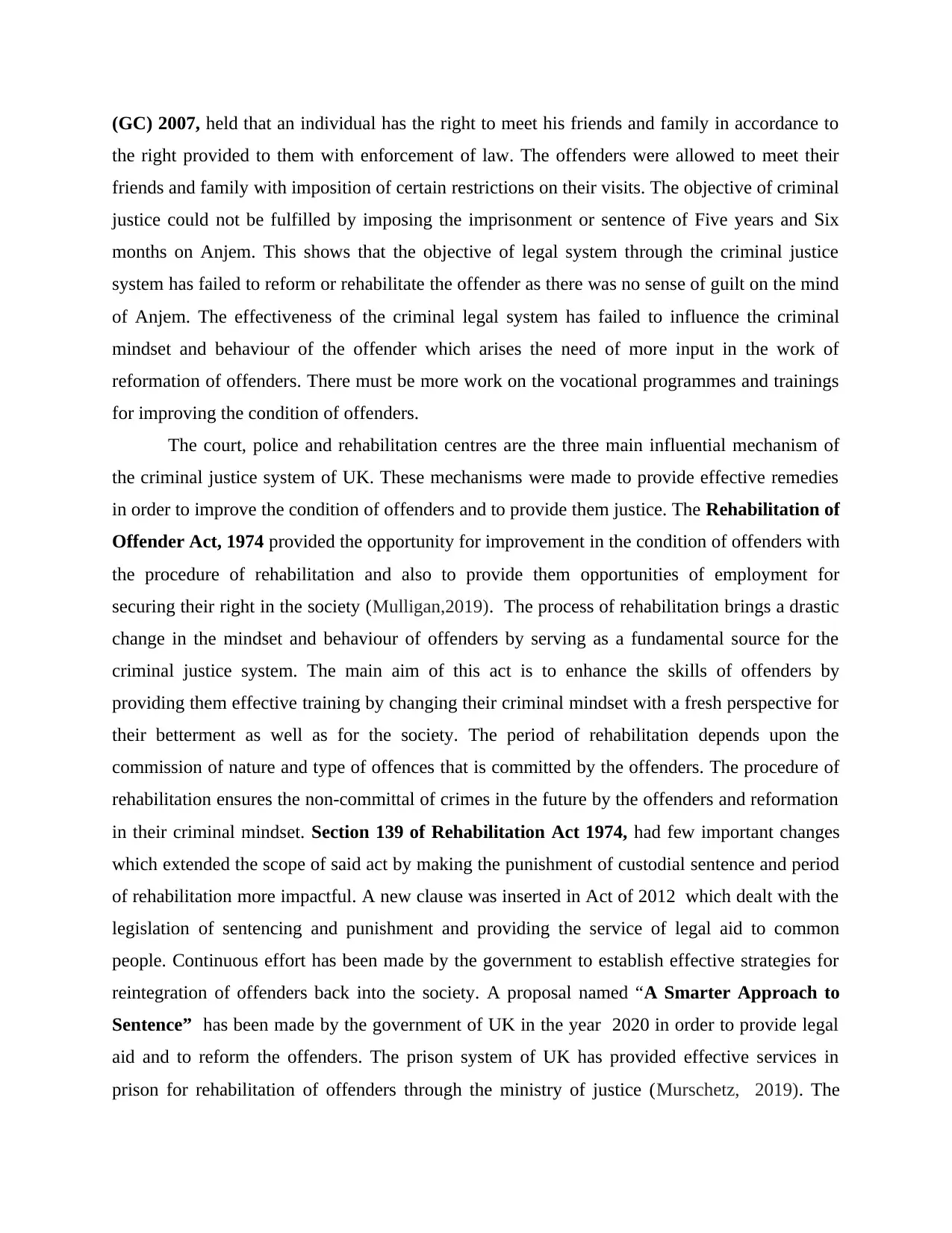
(GC) 2007, held that an individual has the right to meet his friends and family in accordance to
the right provided to them with enforcement of law. The offenders were allowed to meet their
friends and family with imposition of certain restrictions on their visits. The objective of criminal
justice could not be fulfilled by imposing the imprisonment or sentence of Five years and Six
months on Anjem. This shows that the objective of legal system through the criminal justice
system has failed to reform or rehabilitate the offender as there was no sense of guilt on the mind
of Anjem. The effectiveness of the criminal legal system has failed to influence the criminal
mindset and behaviour of the offender which arises the need of more input in the work of
reformation of offenders. There must be more work on the vocational programmes and trainings
for improving the condition of offenders.
The court, police and rehabilitation centres are the three main influential mechanism of
the criminal justice system of UK. These mechanisms were made to provide effective remedies
in order to improve the condition of offenders and to provide them justice. The Rehabilitation of
Offender Act, 1974 provided the opportunity for improvement in the condition of offenders with
the procedure of rehabilitation and also to provide them opportunities of employment for
securing their right in the society (Mulligan,2019). The process of rehabilitation brings a drastic
change in the mindset and behaviour of offenders by serving as a fundamental source for the
criminal justice system. The main aim of this act is to enhance the skills of offenders by
providing them effective training by changing their criminal mindset with a fresh perspective for
their betterment as well as for the society. The period of rehabilitation depends upon the
commission of nature and type of offences that is committed by the offenders. The procedure of
rehabilitation ensures the non-committal of crimes in the future by the offenders and reformation
in their criminal mindset. Section 139 of Rehabilitation Act 1974, had few important changes
which extended the scope of said act by making the punishment of custodial sentence and period
of rehabilitation more impactful. A new clause was inserted in Act of 2012 which dealt with the
legislation of sentencing and punishment and providing the service of legal aid to common
people. Continuous effort has been made by the government to establish effective strategies for
reintegration of offenders back into the society. A proposal named “A Smarter Approach to
Sentence” has been made by the government of UK in the year 2020 in order to provide legal
aid and to reform the offenders. The prison system of UK has provided effective services in
prison for rehabilitation of offenders through the ministry of justice (Murschetz, 2019). The
the right provided to them with enforcement of law. The offenders were allowed to meet their
friends and family with imposition of certain restrictions on their visits. The objective of criminal
justice could not be fulfilled by imposing the imprisonment or sentence of Five years and Six
months on Anjem. This shows that the objective of legal system through the criminal justice
system has failed to reform or rehabilitate the offender as there was no sense of guilt on the mind
of Anjem. The effectiveness of the criminal legal system has failed to influence the criminal
mindset and behaviour of the offender which arises the need of more input in the work of
reformation of offenders. There must be more work on the vocational programmes and trainings
for improving the condition of offenders.
The court, police and rehabilitation centres are the three main influential mechanism of
the criminal justice system of UK. These mechanisms were made to provide effective remedies
in order to improve the condition of offenders and to provide them justice. The Rehabilitation of
Offender Act, 1974 provided the opportunity for improvement in the condition of offenders with
the procedure of rehabilitation and also to provide them opportunities of employment for
securing their right in the society (Mulligan,2019). The process of rehabilitation brings a drastic
change in the mindset and behaviour of offenders by serving as a fundamental source for the
criminal justice system. The main aim of this act is to enhance the skills of offenders by
providing them effective training by changing their criminal mindset with a fresh perspective for
their betterment as well as for the society. The period of rehabilitation depends upon the
commission of nature and type of offences that is committed by the offenders. The procedure of
rehabilitation ensures the non-committal of crimes in the future by the offenders and reformation
in their criminal mindset. Section 139 of Rehabilitation Act 1974, had few important changes
which extended the scope of said act by making the punishment of custodial sentence and period
of rehabilitation more impactful. A new clause was inserted in Act of 2012 which dealt with the
legislation of sentencing and punishment and providing the service of legal aid to common
people. Continuous effort has been made by the government to establish effective strategies for
reintegration of offenders back into the society. A proposal named “A Smarter Approach to
Sentence” has been made by the government of UK in the year 2020 in order to provide legal
aid and to reform the offenders. The prison system of UK has provided effective services in
prison for rehabilitation of offenders through the ministry of justice (Murschetz, 2019). The
⊘ This is a preview!⊘
Do you want full access?
Subscribe today to unlock all pages.

Trusted by 1+ million students worldwide
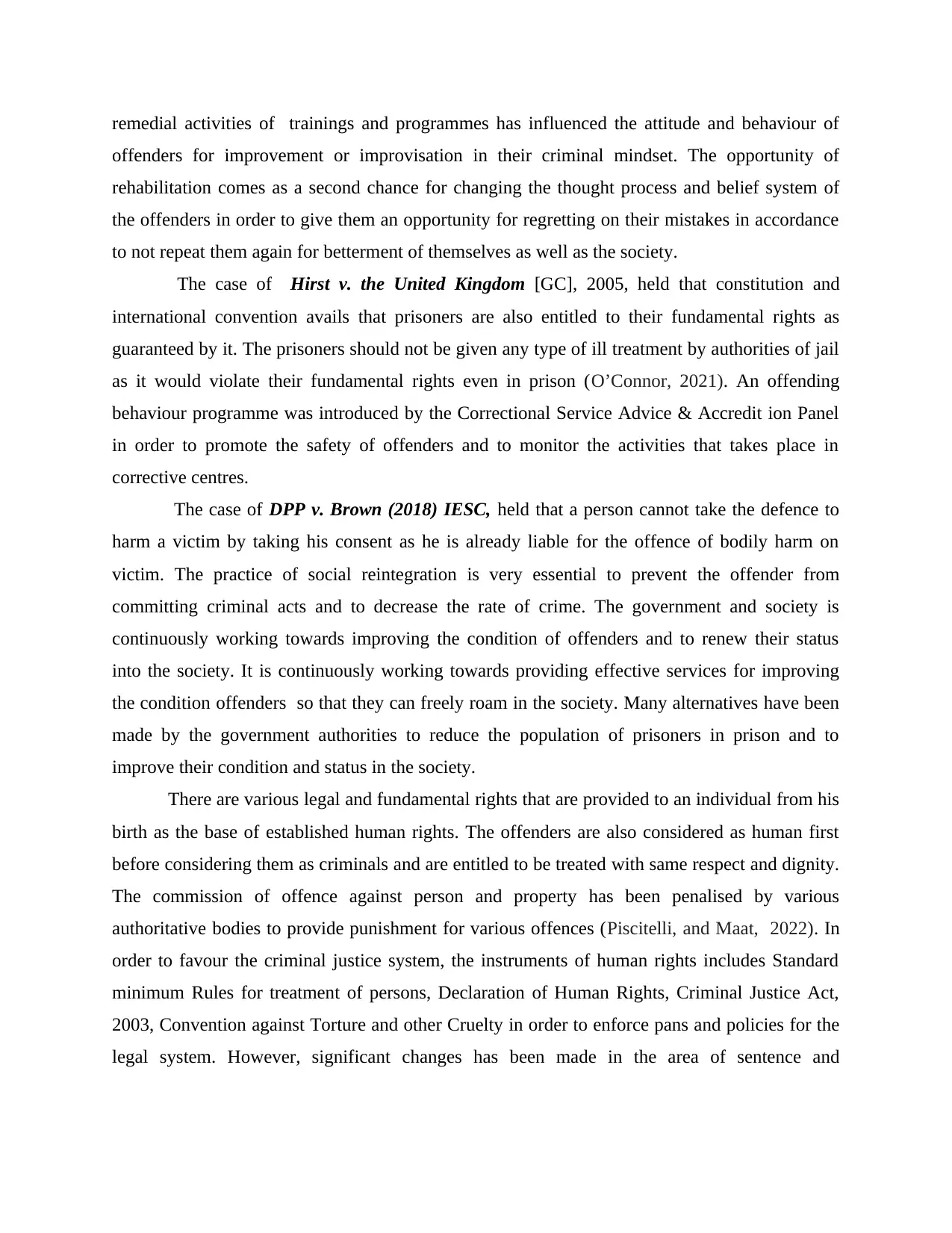
remedial activities of trainings and programmes has influenced the attitude and behaviour of
offenders for improvement or improvisation in their criminal mindset. The opportunity of
rehabilitation comes as a second chance for changing the thought process and belief system of
the offenders in order to give them an opportunity for regretting on their mistakes in accordance
to not repeat them again for betterment of themselves as well as the society.
The case of Hirst v. the United Kingdom [GC], 2005, held that constitution and
international convention avails that prisoners are also entitled to their fundamental rights as
guaranteed by it. The prisoners should not be given any type of ill treatment by authorities of jail
as it would violate their fundamental rights even in prison (O’Connor, 2021). An offending
behaviour programme was introduced by the Correctional Service Advice & Accredit ion Panel
in order to promote the safety of offenders and to monitor the activities that takes place in
corrective centres.
The case of DPP v. Brown (2018) IESC, held that a person cannot take the defence to
harm a victim by taking his consent as he is already liable for the offence of bodily harm on
victim. The practice of social reintegration is very essential to prevent the offender from
committing criminal acts and to decrease the rate of crime. The government and society is
continuously working towards improving the condition of offenders and to renew their status
into the society. It is continuously working towards providing effective services for improving
the condition offenders so that they can freely roam in the society. Many alternatives have been
made by the government authorities to reduce the population of prisoners in prison and to
improve their condition and status in the society.
There are various legal and fundamental rights that are provided to an individual from his
birth as the base of established human rights. The offenders are also considered as human first
before considering them as criminals and are entitled to be treated with same respect and dignity.
The commission of offence against person and property has been penalised by various
authoritative bodies to provide punishment for various offences (Piscitelli, and Maat, 2022). In
order to favour the criminal justice system, the instruments of human rights includes Standard
minimum Rules for treatment of persons, Declaration of Human Rights, Criminal Justice Act,
2003, Convention against Torture and other Cruelty in order to enforce pans and policies for the
legal system. However, significant changes has been made in the area of sentence and
offenders for improvement or improvisation in their criminal mindset. The opportunity of
rehabilitation comes as a second chance for changing the thought process and belief system of
the offenders in order to give them an opportunity for regretting on their mistakes in accordance
to not repeat them again for betterment of themselves as well as the society.
The case of Hirst v. the United Kingdom [GC], 2005, held that constitution and
international convention avails that prisoners are also entitled to their fundamental rights as
guaranteed by it. The prisoners should not be given any type of ill treatment by authorities of jail
as it would violate their fundamental rights even in prison (O’Connor, 2021). An offending
behaviour programme was introduced by the Correctional Service Advice & Accredit ion Panel
in order to promote the safety of offenders and to monitor the activities that takes place in
corrective centres.
The case of DPP v. Brown (2018) IESC, held that a person cannot take the defence to
harm a victim by taking his consent as he is already liable for the offence of bodily harm on
victim. The practice of social reintegration is very essential to prevent the offender from
committing criminal acts and to decrease the rate of crime. The government and society is
continuously working towards improving the condition of offenders and to renew their status
into the society. It is continuously working towards providing effective services for improving
the condition offenders so that they can freely roam in the society. Many alternatives have been
made by the government authorities to reduce the population of prisoners in prison and to
improve their condition and status in the society.
There are various legal and fundamental rights that are provided to an individual from his
birth as the base of established human rights. The offenders are also considered as human first
before considering them as criminals and are entitled to be treated with same respect and dignity.
The commission of offence against person and property has been penalised by various
authoritative bodies to provide punishment for various offences (Piscitelli, and Maat, 2022). In
order to favour the criminal justice system, the instruments of human rights includes Standard
minimum Rules for treatment of persons, Declaration of Human Rights, Criminal Justice Act,
2003, Convention against Torture and other Cruelty in order to enforce pans and policies for the
legal system. However, significant changes has been made in the area of sentence and
Paraphrase This Document
Need a fresh take? Get an instant paraphrase of this document with our AI Paraphraser
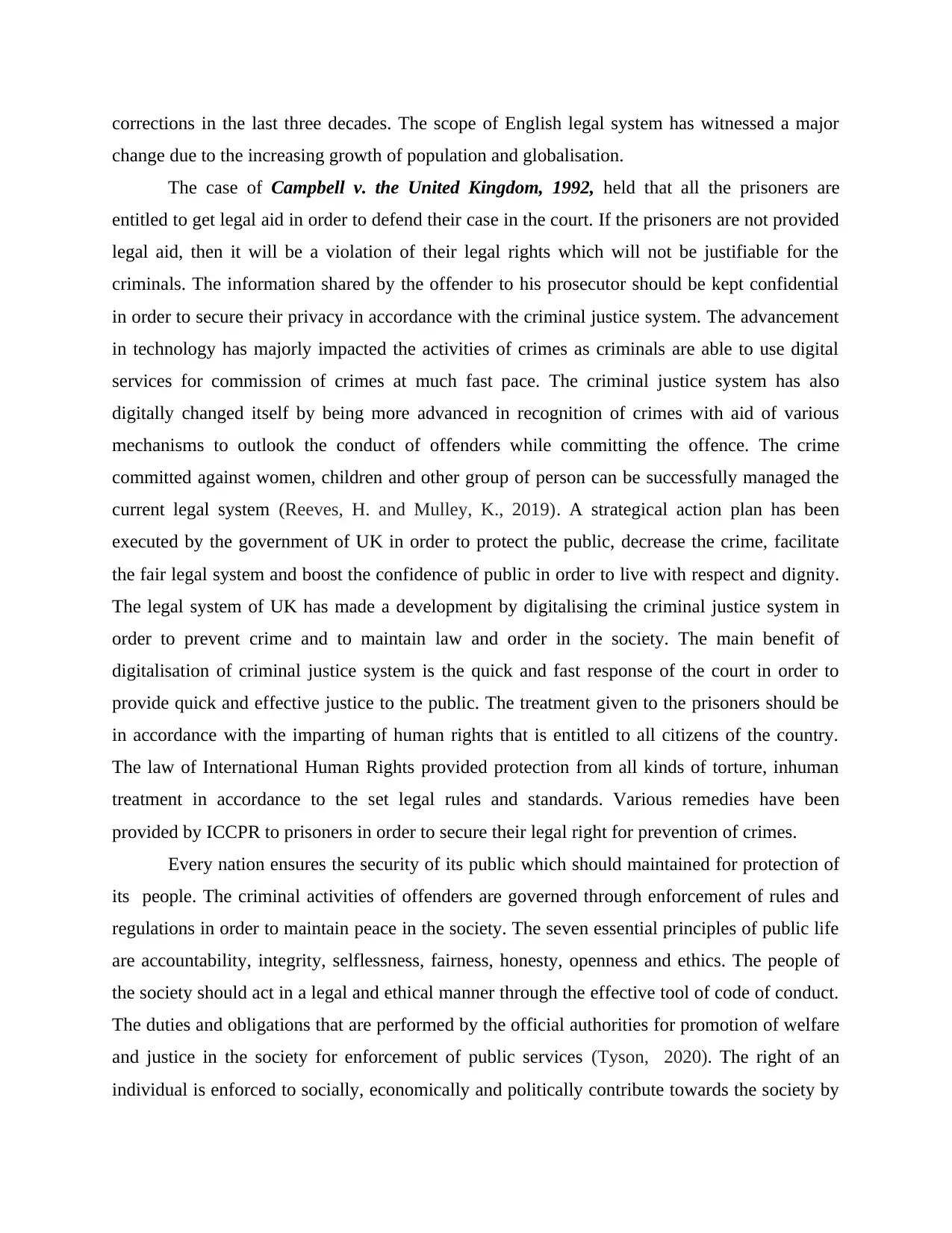
corrections in the last three decades. The scope of English legal system has witnessed a major
change due to the increasing growth of population and globalisation.
The case of Campbell v. the United Kingdom, 1992, held that all the prisoners are
entitled to get legal aid in order to defend their case in the court. If the prisoners are not provided
legal aid, then it will be a violation of their legal rights which will not be justifiable for the
criminals. The information shared by the offender to his prosecutor should be kept confidential
in order to secure their privacy in accordance with the criminal justice system. The advancement
in technology has majorly impacted the activities of crimes as criminals are able to use digital
services for commission of crimes at much fast pace. The criminal justice system has also
digitally changed itself by being more advanced in recognition of crimes with aid of various
mechanisms to outlook the conduct of offenders while committing the offence. The crime
committed against women, children and other group of person can be successfully managed the
current legal system (Reeves, H. and Mulley, K., 2019). A strategical action plan has been
executed by the government of UK in order to protect the public, decrease the crime, facilitate
the fair legal system and boost the confidence of public in order to live with respect and dignity.
The legal system of UK has made a development by digitalising the criminal justice system in
order to prevent crime and to maintain law and order in the society. The main benefit of
digitalisation of criminal justice system is the quick and fast response of the court in order to
provide quick and effective justice to the public. The treatment given to the prisoners should be
in accordance with the imparting of human rights that is entitled to all citizens of the country.
The law of International Human Rights provided protection from all kinds of torture, inhuman
treatment in accordance to the set legal rules and standards. Various remedies have been
provided by ICCPR to prisoners in order to secure their legal right for prevention of crimes.
Every nation ensures the security of its public which should maintained for protection of
its people. The criminal activities of offenders are governed through enforcement of rules and
regulations in order to maintain peace in the society. The seven essential principles of public life
are accountability, integrity, selflessness, fairness, honesty, openness and ethics. The people of
the society should act in a legal and ethical manner through the effective tool of code of conduct.
The duties and obligations that are performed by the official authorities for promotion of welfare
and justice in the society for enforcement of public services (Tyson, 2020). The right of an
individual is enforced to socially, economically and politically contribute towards the society by
change due to the increasing growth of population and globalisation.
The case of Campbell v. the United Kingdom, 1992, held that all the prisoners are
entitled to get legal aid in order to defend their case in the court. If the prisoners are not provided
legal aid, then it will be a violation of their legal rights which will not be justifiable for the
criminals. The information shared by the offender to his prosecutor should be kept confidential
in order to secure their privacy in accordance with the criminal justice system. The advancement
in technology has majorly impacted the activities of crimes as criminals are able to use digital
services for commission of crimes at much fast pace. The criminal justice system has also
digitally changed itself by being more advanced in recognition of crimes with aid of various
mechanisms to outlook the conduct of offenders while committing the offence. The crime
committed against women, children and other group of person can be successfully managed the
current legal system (Reeves, H. and Mulley, K., 2019). A strategical action plan has been
executed by the government of UK in order to protect the public, decrease the crime, facilitate
the fair legal system and boost the confidence of public in order to live with respect and dignity.
The legal system of UK has made a development by digitalising the criminal justice system in
order to prevent crime and to maintain law and order in the society. The main benefit of
digitalisation of criminal justice system is the quick and fast response of the court in order to
provide quick and effective justice to the public. The treatment given to the prisoners should be
in accordance with the imparting of human rights that is entitled to all citizens of the country.
The law of International Human Rights provided protection from all kinds of torture, inhuman
treatment in accordance to the set legal rules and standards. Various remedies have been
provided by ICCPR to prisoners in order to secure their legal right for prevention of crimes.
Every nation ensures the security of its public which should maintained for protection of
its people. The criminal activities of offenders are governed through enforcement of rules and
regulations in order to maintain peace in the society. The seven essential principles of public life
are accountability, integrity, selflessness, fairness, honesty, openness and ethics. The people of
the society should act in a legal and ethical manner through the effective tool of code of conduct.
The duties and obligations that are performed by the official authorities for promotion of welfare
and justice in the society for enforcement of public services (Tyson, 2020). The right of an
individual is enforced to socially, economically and politically contribute towards the society by
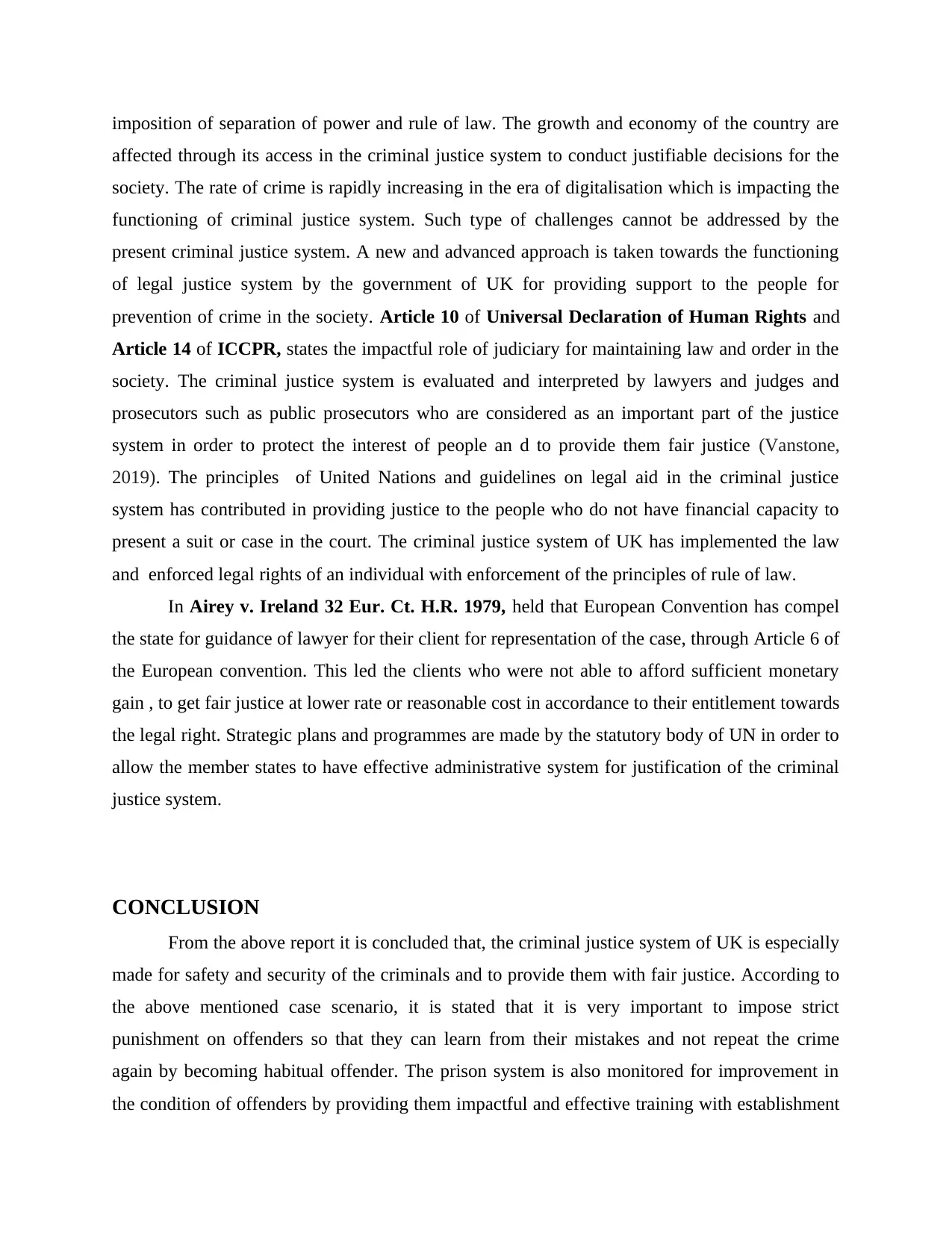
imposition of separation of power and rule of law. The growth and economy of the country are
affected through its access in the criminal justice system to conduct justifiable decisions for the
society. The rate of crime is rapidly increasing in the era of digitalisation which is impacting the
functioning of criminal justice system. Such type of challenges cannot be addressed by the
present criminal justice system. A new and advanced approach is taken towards the functioning
of legal justice system by the government of UK for providing support to the people for
prevention of crime in the society. Article 10 of Universal Declaration of Human Rights and
Article 14 of ICCPR, states the impactful role of judiciary for maintaining law and order in the
society. The criminal justice system is evaluated and interpreted by lawyers and judges and
prosecutors such as public prosecutors who are considered as an important part of the justice
system in order to protect the interest of people an d to provide them fair justice (Vanstone,
2019). The principles of United Nations and guidelines on legal aid in the criminal justice
system has contributed in providing justice to the people who do not have financial capacity to
present a suit or case in the court. The criminal justice system of UK has implemented the law
and enforced legal rights of an individual with enforcement of the principles of rule of law.
In Airey v. Ireland 32 Eur. Ct. H.R. 1979, held that European Convention has compel
the state for guidance of lawyer for their client for representation of the case, through Article 6 of
the European convention. This led the clients who were not able to afford sufficient monetary
gain , to get fair justice at lower rate or reasonable cost in accordance to their entitlement towards
the legal right. Strategic plans and programmes are made by the statutory body of UN in order to
allow the member states to have effective administrative system for justification of the criminal
justice system.
CONCLUSION
From the above report it is concluded that, the criminal justice system of UK is especially
made for safety and security of the criminals and to provide them with fair justice. According to
the above mentioned case scenario, it is stated that it is very important to impose strict
punishment on offenders so that they can learn from their mistakes and not repeat the crime
again by becoming habitual offender. The prison system is also monitored for improvement in
the condition of offenders by providing them impactful and effective training with establishment
affected through its access in the criminal justice system to conduct justifiable decisions for the
society. The rate of crime is rapidly increasing in the era of digitalisation which is impacting the
functioning of criminal justice system. Such type of challenges cannot be addressed by the
present criminal justice system. A new and advanced approach is taken towards the functioning
of legal justice system by the government of UK for providing support to the people for
prevention of crime in the society. Article 10 of Universal Declaration of Human Rights and
Article 14 of ICCPR, states the impactful role of judiciary for maintaining law and order in the
society. The criminal justice system is evaluated and interpreted by lawyers and judges and
prosecutors such as public prosecutors who are considered as an important part of the justice
system in order to protect the interest of people an d to provide them fair justice (Vanstone,
2019). The principles of United Nations and guidelines on legal aid in the criminal justice
system has contributed in providing justice to the people who do not have financial capacity to
present a suit or case in the court. The criminal justice system of UK has implemented the law
and enforced legal rights of an individual with enforcement of the principles of rule of law.
In Airey v. Ireland 32 Eur. Ct. H.R. 1979, held that European Convention has compel
the state for guidance of lawyer for their client for representation of the case, through Article 6 of
the European convention. This led the clients who were not able to afford sufficient monetary
gain , to get fair justice at lower rate or reasonable cost in accordance to their entitlement towards
the legal right. Strategic plans and programmes are made by the statutory body of UN in order to
allow the member states to have effective administrative system for justification of the criminal
justice system.
CONCLUSION
From the above report it is concluded that, the criminal justice system of UK is especially
made for safety and security of the criminals and to provide them with fair justice. According to
the above mentioned case scenario, it is stated that it is very important to impose strict
punishment on offenders so that they can learn from their mistakes and not repeat the crime
again by becoming habitual offender. The prison system is also monitored for improvement in
the condition of offenders by providing them impactful and effective training with establishment
⊘ This is a preview!⊘
Do you want full access?
Subscribe today to unlock all pages.

Trusted by 1+ million students worldwide
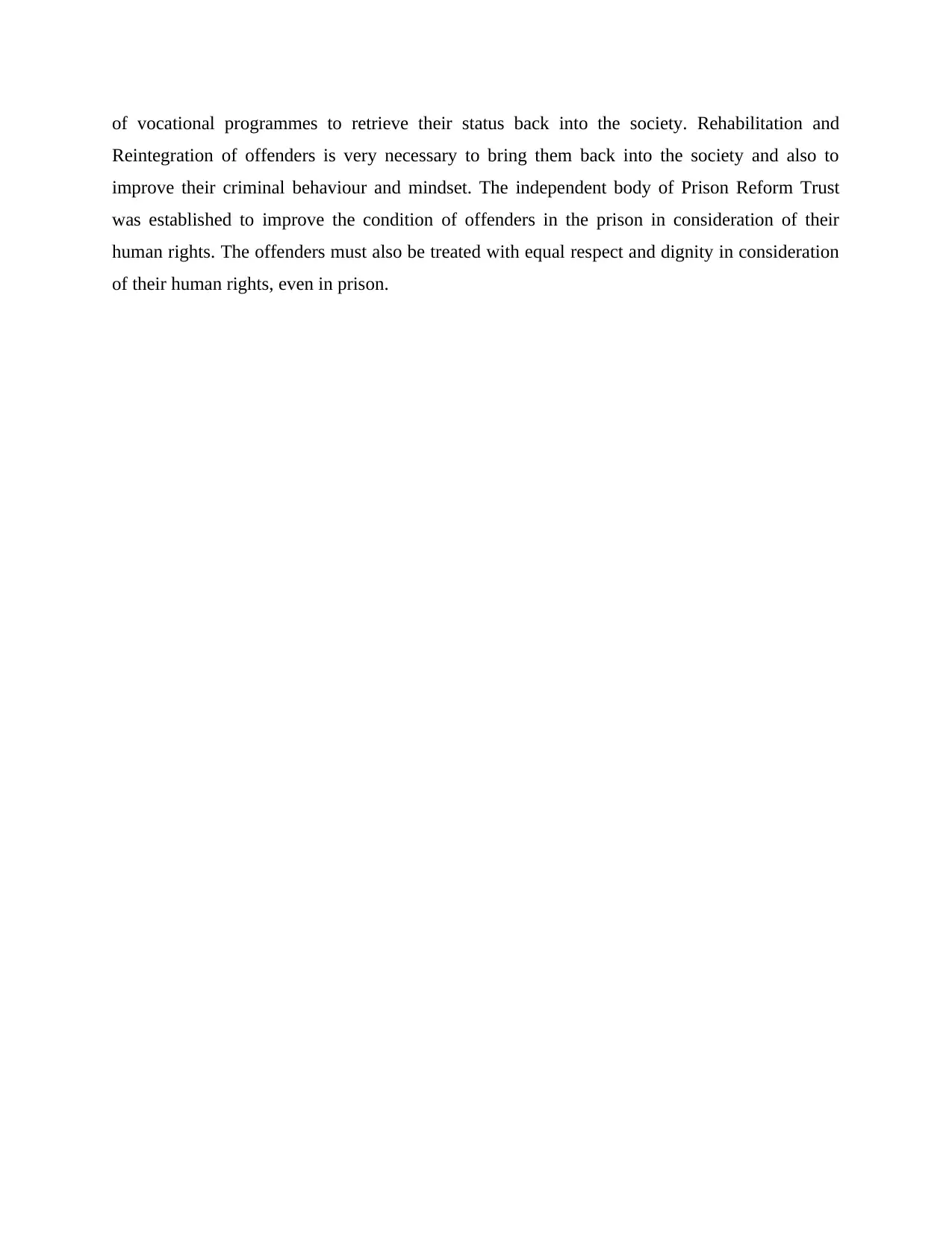
of vocational programmes to retrieve their status back into the society. Rehabilitation and
Reintegration of offenders is very necessary to bring them back into the society and also to
improve their criminal behaviour and mindset. The independent body of Prison Reform Trust
was established to improve the condition of offenders in the prison in consideration of their
human rights. The offenders must also be treated with equal respect and dignity in consideration
of their human rights, even in prison.
Reintegration of offenders is very necessary to bring them back into the society and also to
improve their criminal behaviour and mindset. The independent body of Prison Reform Trust
was established to improve the condition of offenders in the prison in consideration of their
human rights. The offenders must also be treated with equal respect and dignity in consideration
of their human rights, even in prison.
Paraphrase This Document
Need a fresh take? Get an instant paraphrase of this document with our AI Paraphraser
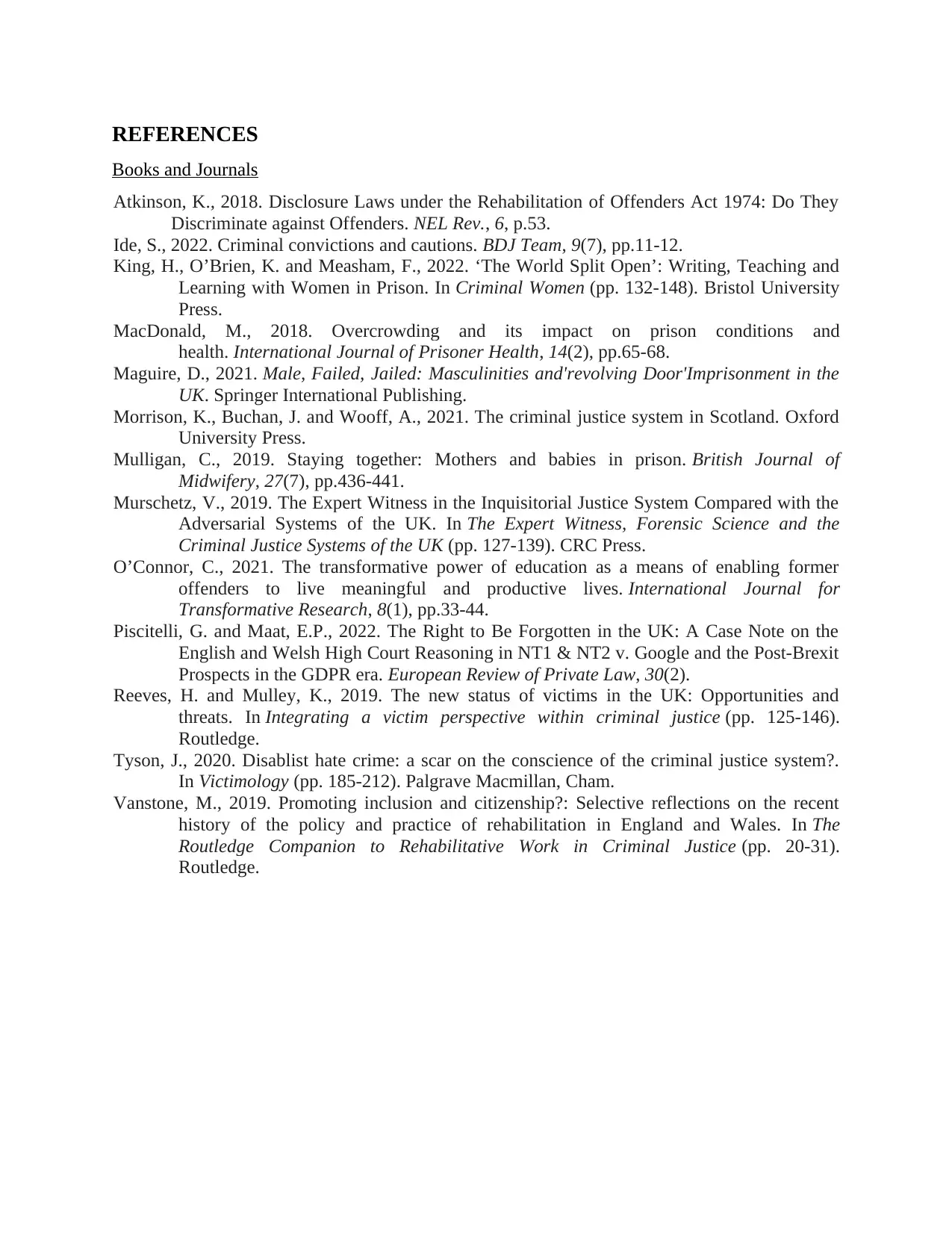
REFERENCES
Books and Journals
Atkinson, K., 2018. Disclosure Laws under the Rehabilitation of Offenders Act 1974: Do They
Discriminate against Offenders. NEL Rev., 6, p.53.
Ide, S., 2022. Criminal convictions and cautions. BDJ Team, 9(7), pp.11-12.
King, H., O’Brien, K. and Measham, F., 2022. ‘The World Split Open’: Writing, Teaching and
Learning with Women in Prison. In Criminal Women (pp. 132-148). Bristol University
Press.
MacDonald, M., 2018. Overcrowding and its impact on prison conditions and
health. International Journal of Prisoner Health, 14(2), pp.65-68.
Maguire, D., 2021. Male, Failed, Jailed: Masculinities and'revolving Door'Imprisonment in the
UK. Springer International Publishing.
Morrison, K., Buchan, J. and Wooff, A., 2021. The criminal justice system in Scotland. Oxford
University Press.
Mulligan, C., 2019. Staying together: Mothers and babies in prison. British Journal of
Midwifery, 27(7), pp.436-441.
Murschetz, V., 2019. The Expert Witness in the Inquisitorial Justice System Compared with the
Adversarial Systems of the UK. In The Expert Witness, Forensic Science and the
Criminal Justice Systems of the UK (pp. 127-139). CRC Press.
O’Connor, C., 2021. The transformative power of education as a means of enabling former
offenders to live meaningful and productive lives. International Journal for
Transformative Research, 8(1), pp.33-44.
Piscitelli, G. and Maat, E.P., 2022. The Right to Be Forgotten in the UK: A Case Note on the
English and Welsh High Court Reasoning in NT1 & NT2 v. Google and the Post-Brexit
Prospects in the GDPR era. European Review of Private Law, 30(2).
Reeves, H. and Mulley, K., 2019. The new status of victims in the UK: Opportunities and
threats. In Integrating a victim perspective within criminal justice (pp. 125-146).
Routledge.
Tyson, J., 2020. Disablist hate crime: a scar on the conscience of the criminal justice system?.
In Victimology (pp. 185-212). Palgrave Macmillan, Cham.
Vanstone, M., 2019. Promoting inclusion and citizenship?: Selective reflections on the recent
history of the policy and practice of rehabilitation in England and Wales. In The
Routledge Companion to Rehabilitative Work in Criminal Justice (pp. 20-31).
Routledge.
Books and Journals
Atkinson, K., 2018. Disclosure Laws under the Rehabilitation of Offenders Act 1974: Do They
Discriminate against Offenders. NEL Rev., 6, p.53.
Ide, S., 2022. Criminal convictions and cautions. BDJ Team, 9(7), pp.11-12.
King, H., O’Brien, K. and Measham, F., 2022. ‘The World Split Open’: Writing, Teaching and
Learning with Women in Prison. In Criminal Women (pp. 132-148). Bristol University
Press.
MacDonald, M., 2018. Overcrowding and its impact on prison conditions and
health. International Journal of Prisoner Health, 14(2), pp.65-68.
Maguire, D., 2021. Male, Failed, Jailed: Masculinities and'revolving Door'Imprisonment in the
UK. Springer International Publishing.
Morrison, K., Buchan, J. and Wooff, A., 2021. The criminal justice system in Scotland. Oxford
University Press.
Mulligan, C., 2019. Staying together: Mothers and babies in prison. British Journal of
Midwifery, 27(7), pp.436-441.
Murschetz, V., 2019. The Expert Witness in the Inquisitorial Justice System Compared with the
Adversarial Systems of the UK. In The Expert Witness, Forensic Science and the
Criminal Justice Systems of the UK (pp. 127-139). CRC Press.
O’Connor, C., 2021. The transformative power of education as a means of enabling former
offenders to live meaningful and productive lives. International Journal for
Transformative Research, 8(1), pp.33-44.
Piscitelli, G. and Maat, E.P., 2022. The Right to Be Forgotten in the UK: A Case Note on the
English and Welsh High Court Reasoning in NT1 & NT2 v. Google and the Post-Brexit
Prospects in the GDPR era. European Review of Private Law, 30(2).
Reeves, H. and Mulley, K., 2019. The new status of victims in the UK: Opportunities and
threats. In Integrating a victim perspective within criminal justice (pp. 125-146).
Routledge.
Tyson, J., 2020. Disablist hate crime: a scar on the conscience of the criminal justice system?.
In Victimology (pp. 185-212). Palgrave Macmillan, Cham.
Vanstone, M., 2019. Promoting inclusion and citizenship?: Selective reflections on the recent
history of the policy and practice of rehabilitation in England and Wales. In The
Routledge Companion to Rehabilitative Work in Criminal Justice (pp. 20-31).
Routledge.
1 out of 11
Related Documents
Your All-in-One AI-Powered Toolkit for Academic Success.
+13062052269
info@desklib.com
Available 24*7 on WhatsApp / Email
![[object Object]](/_next/static/media/star-bottom.7253800d.svg)
Unlock your academic potential
Copyright © 2020–2025 A2Z Services. All Rights Reserved. Developed and managed by ZUCOL.





